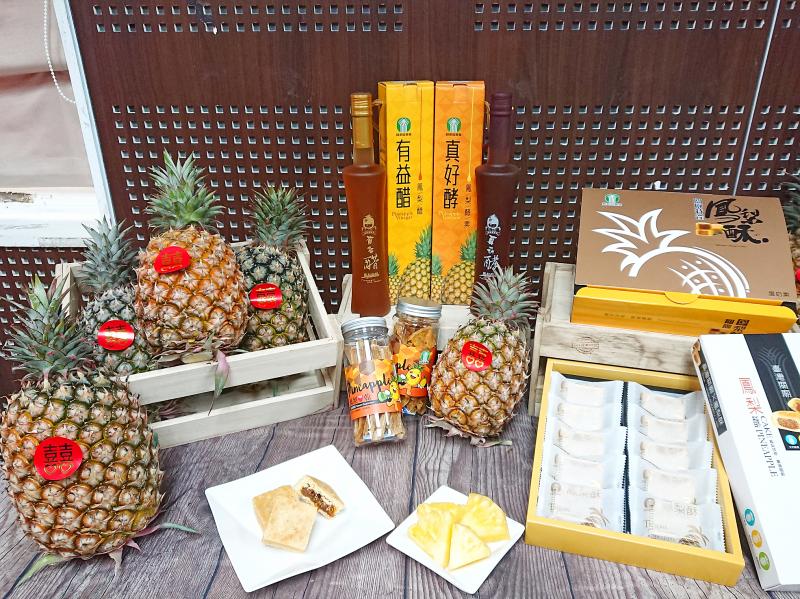Taiwanese firms responded swiftly to a call to buy the nation’s surplus pineapple crop after China abruptly stopped imports, with 10 local firms placing orders totaling 1,600 tonnes, Council of Agriculture officials said yesterday.
China on Friday announced that it would suspend pineapple imports from Taiwan starting tomorrow, saying that various types of mealybugs were found in several batches of fresh pineapples bought from the nation last year.
Taiwanese farmers expressed anger and disappointment over the decision.

Photo: Hung Jui-chin, Taipei Times
The council said it had dealt with the pests after China notified it of their discovery in 13 batches of pineapples sent between March and May last year.
It had not received reports of the pests since new measures took effect on Oct. 19, it said.
Excluding the 13 batches, 99.79 percent of the pineapples sent to China since last year have met Chinese import standards, it added.
Following China’s import ban, government officials called on Taiwanese to support the nation’s pineapple farmers, who are preparing for the harvest season.
The council has set up a hotline for companies to place large orders, and it took measures to stabilize pineapple prices.
Taiwan’s annual pineapple production has averaged about 420,000 tonnes over the past few years, of which nearly 50,000 tonnes were exported to China, government data showed.
Taiwan last year exported 41,661 tonnes of pineapples to China for NT$1.49 billion (US$52.64 million), accounting for 91 percent of total pineapple exports, the data showed.
“We are looking at companies to place orders to present pineapples as gifts to employees and customers. We have already received orders for 1,600 tonnes in one day, which is close to 10 percent of our target of 20,000 tonnes for the domestic market,” council officials said yesterday. “If more companies join in, we could reach the target in 12 days.”
The council said it would strive to expand the fruit’s global market and export another 30,000 tonnes to other countries, which, combined with the 20,000 tonnes targeted for the domestic market, would make up for the shortfall created by the Chinese ban.
Premier Su Tseng-chang (蘇貞昌) is to visit Pingtung County’s Kaoshu Township (高樹) today to inspect the area’s pineapple farms and show support to pineapple farmers, sources said.
Su has approved a NT$1 billion package to stabilize pineapple prices, Cabinet spokesman Lo Ping-cheng (羅秉成) said, adding that the premier has also instructed the council to draw up plans to promote the fruit’s consumption.
Su deems the situation a trade issue and not a political one, sources said, adding that the council would seek the WTO’s help to negotiate with Beijing.
Minister of Foreign Affairs Joseph Wu (吳釗燮) took to Twitter on Friday, urging friends around the world to stand with Taiwan and “rally behind the #FreedomPineapple.”
Additional reporting by CNA

Right-wing political scientist Laura Fernandez on Sunday won Costa Rica’s presidential election by a landslide, after promising to crack down on rising violence linked to the cocaine trade. Fernandez’s nearest rival, economist Alvaro Ramos, conceded defeat as results showed the ruling party far exceeding the threshold of 40 percent needed to avoid a runoff. With 94 percent of polling stations counted, the political heir of outgoing Costa Rican President Rodrigo Chaves had captured 48.3 percent of the vote compared with Ramos’ 33.4 percent, the Supreme Electoral Tribunal said. As soon as the first results were announced, members of Fernandez’s Sovereign People’s Party

EMERGING FIELDS: The Chinese president said that the two countries would explore cooperation in green technology, the digital economy and artificial intelligence Chinese President Xi Jinping (習近平) yesterday called for an “equal and orderly multipolar world” in the face of “unilateral bullying,” in an apparent jab at the US. Xi was speaking during talks in Beijing with Uruguayan President Yamandu Orsi, the first South American leader to visit China since US special forces captured then-Venezuelan president Nicolas Maduro last month — an operation that Beijing condemned as a violation of sovereignty. Orsi follows a slew of leaders to have visited China seeking to boost ties with the world’s second-largest economy to hedge against US President Donald Trump’s increasingly unpredictable administration. “The international situation is fraught

MORE RESPONSIBILITY: Draftees would be expected to fight alongside professional soldiers, likely requiring the transformation of some training brigades into combat units The armed forces are to start incorporating new conscripts into combined arms brigades this year to enhance combat readiness, the Executive Yuan’s latest policy report said. The new policy would affect Taiwanese men entering the military for their compulsory service, which was extended to one year under reforms by then-president Tsai Ing-wen (蔡英文) in 2022. The conscripts would be trained to operate machine guns, uncrewed aerial vehicles, anti-tank guided missile launchers and Stinger air defense systems, the report said, adding that the basic training would be lengthened to eight weeks. After basic training, conscripts would be sorted into infantry battalions that would take

GROWING AMBITIONS: The scale and tempo of the operations show that the Strait has become the core theater for China to expand its security interests, the report said Chinese military aircraft incursions around Taiwan have surged nearly 15-fold over the past five years, according to a report released yesterday by the Democratic Progressive Party’s (DPP) Department of China Affairs. Sorties in the Taiwan Strait were previously irregular, totaling 380 in 2020, but have since evolved into routine operations, the report showed. “This demonstrates that the Taiwan Strait has become both the starting point and testing ground for Beijing’s expansionist ambitions,” it said. Driven by military expansionism, China is systematically pursuing actions aimed at altering the regional “status quo,” the department said, adding that Taiwan represents the most critical link in China’s